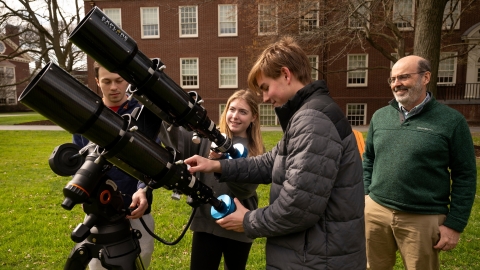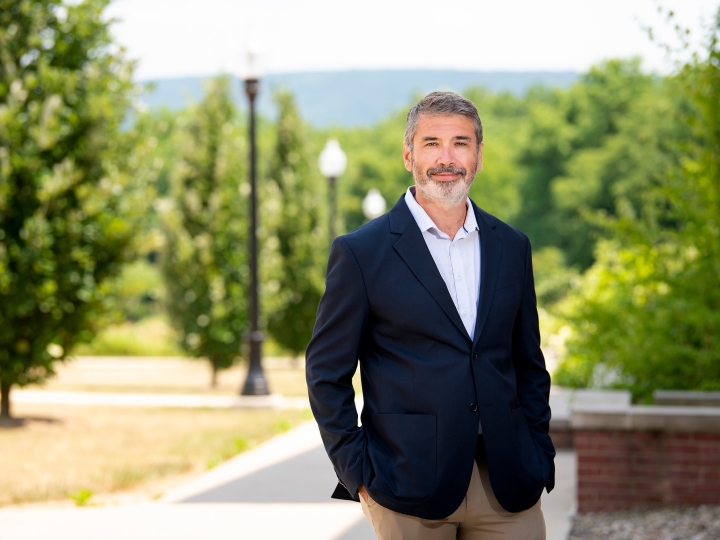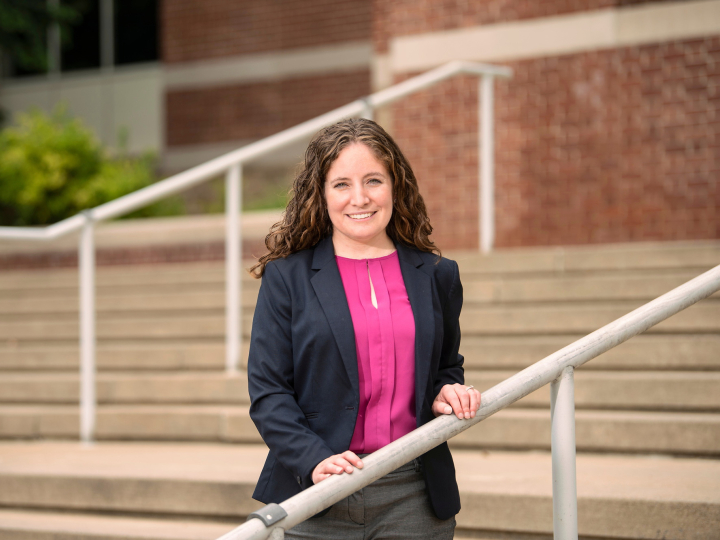
Bucknell Class Plans Educational Eclipse Excursion to Texas
April 4, 2024
Matthew Stempel '26 (left), Eliza Ray '24 (center left) and Hunter Gehman '25 (center right) position a telescope under the watchful eye of Professor Ned Ladd, physics & astronomy. Photo by Emily Paine, Marketing & Communications
Led by Professor Ned Ladd, physics & astronomy, a class of 13 Bucknell University students is traveling with additional faculty and staff to Addison, Texas, to see the solar eclipse in its clearest totality path Monday. Their trip will both gather eclipse-related research and educate students who attend Addison's Greenhill School.
The Bucknell students have been preparing for the trip this semester during Ladd's half-credit class that taught them both the proper use and positioning of refracting telescopes, which will be used to collect data on solar oscillations from the corona of the eclipse.
During the last solar eclipse in 2017, Ladd led a similar study trip to Tennessee where students also gathered corona oscillation data. The 2017 group discovered a solar heating problem in the corona, and this year's student team will replicate that study to validate its findings and ensure their accuracy.
"As you move farther away from the corona, it gets hotter, which doesn't line up with physics as we know it," says Virginia Hostetter '25, physics. "We think it has something to do with the magnetic fields, and so studying the oscillations gives a way to measure the effects of those fields."
The students will only have three-and-a-half minutes of totality during the eclipse to gather data on the corona, so accurate alignment of their telescopes is critical. They have been meticulously practicing by focusing on stars at night.
"This is hard to do, and if we pull it off, it'll be because we worked really hard and because we succeeded together," says Ladd.
"One of the problems with doing eclipse science is that totality is three-and-a-half minutes long. So if you have a problem and you fix it four minutes after you discover the problem, you've missed the eclipse and you have to come back 20 years later," he adds. [There won't be another U.S. eclipse spanning coast to coast until 2045.]
The students are confident they're ready when the moment arrives, and they're quite excited about the experience too.
"There are two reasons I'm excited," says Cole Kratz '26, mathematics. “This is a nationwide event where our professor said there will be 200 million people there to see it, and we’re making measurements on an event that’s rare and won't happen again for 20 years, so that's very exciting."
"For me, this is my first field site observation and experiment, and I'm excited to take part in a project that is from the ground up — with my own hands and not something that the professors are setting up for me," says Hostetter.
Before commencing their research, the Bucknell students will engage with approximately 1,200 students from all grade levels at the Greenhill School, where they will present and conduct eclipse-related activities about physics and astronomy.
"First we're going to have a presentation for the students, and then we're preparing to have a fair, so we'll be outside and have a bunch of different stations which we'll name after different planets," says Eliza Ray '24, education. "We're going to have the students look through solar telescopes — like a sun-spotter to teach them about sunspots — and teach them about the difference between solar and lunar eclipses and the positioning. They're all ages, so that's part of our challenge, figuring out how to cater the educational message to different age groups."
The educational component should enhance the overall educational experience for the Bucknell students according to their professor.
"An eclipse is an awesome event, but what we're trying to do here is very much science in action and consequential," Ladd says. "So if we pull it off and the experiments go well and hundreds of the Greenhill students get something out of this, it will be remarkably rewarding."

